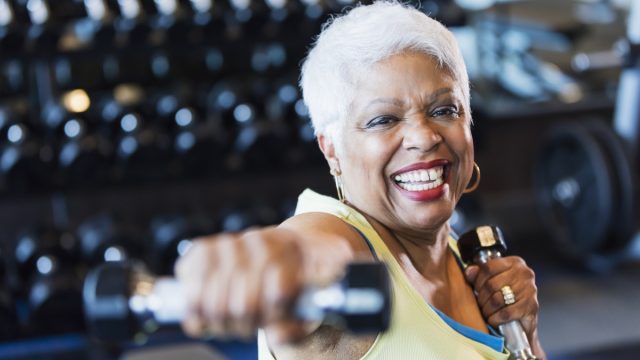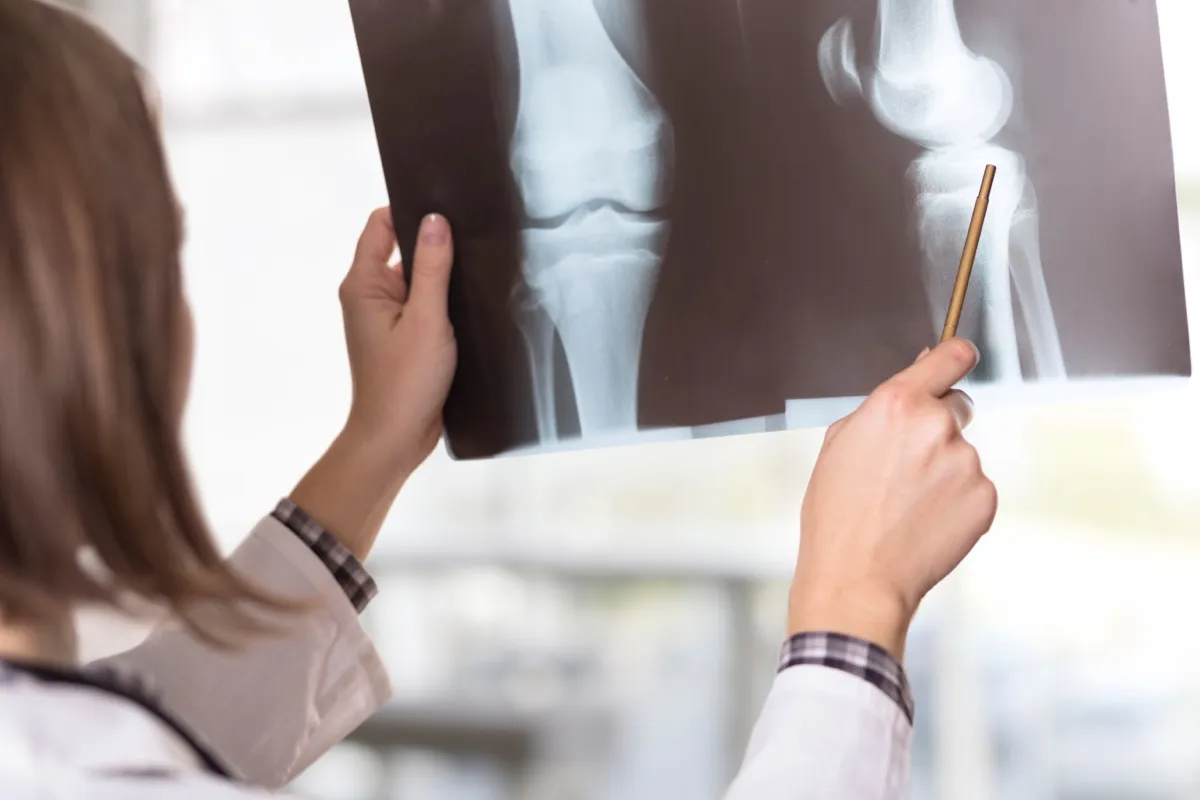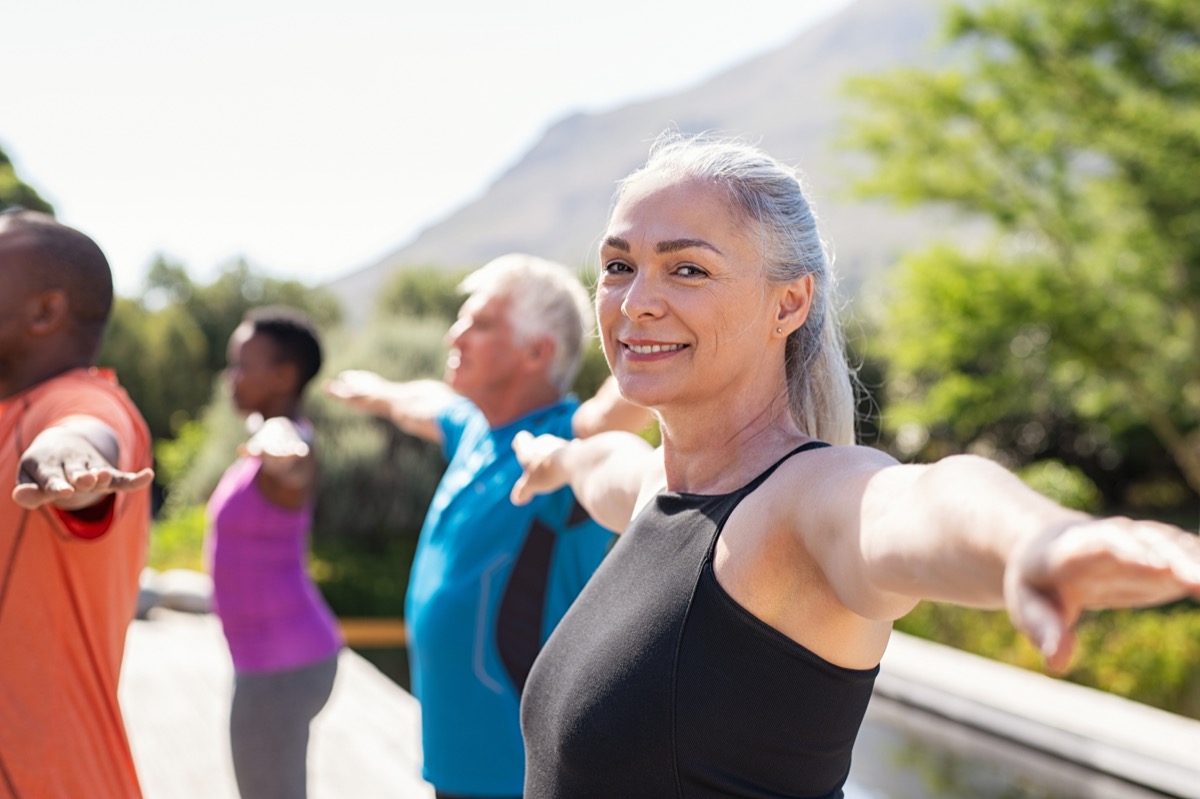6 Reasons Weightlifting Is the Most Important Exercise for Women Over 50, According to Experts
Pumping iron can boost your health and help you age powerfully.

Along with eating a healthy diet and not smoking, working out is one of the single best things you can do for your health. But as experts from the National Institute on Aging (NIA) are quick to point out, not all exercise is the same. They say it's important to perform a range physical activities that build on four core areas of health. These are endurance, strength, balance, and flexibility—and each is crucial to your well-being.
However, one of these categories becomes increasingly important with age, especially among women. Weightlifting—an effective form of strength training—can keep you in peak physical form well into your senior years.
"The best weightlifting exercises include squats, deadlifts, bench press, and planks," says Taylor Kuhlmann, PT, a licensed physical therapist, certified strength and conditioning specialist, and founder of the website High Caliber Health. "These exercises will improve strength of the entire body and can help improve balance and decrease the negative effects of aging," he adds.
Read on to learn the six reasons weightlifting is the most important exercise for women over 50, and what you stand to gain by starting today.
READ THIS NEXT: If You're Between 50 and 80, You Should Be Doing This Daily, Doctors Say.
1
It keeps bones strong

One of the biggest benefits of weightlifting as you get older is that it counteracts the natural decline in bone density experienced by women over the age of 50.
"Weightlifting is a great method of exercise that can help your musculoskeletal system stay strong, mobile and injury-free for longer," explains Samuel Hobson, BSc, MCSP, a musculoskeletal physiotherapist at The Menopause Consortium. That's because weight-bearing activities apply tension to the bones, which prompts them to produce more bone tissue. "The controlled rotation and tugging on the bone during exercises stimulates osteogenesis (bone formation) and produces more dense bones, meaning they are less susceptible to breaking," Hobson tells Best Life.
READ THIS NEXT: If You Take This Medication, You're More Likely to Get a Blood Clot.
2
It builds muscle

Similarly, weightlifting can also help improve muscle mass—which is increasingly important with age. "Muscle mass decreases approximately three to eight percent per decade after the age of 30 and this rate of decline is even higher after the age of 60," says a 2010 study published in the journal Current Opinions in Clinical Nutrition and Metabolic Care. "This involuntary loss of muscle mass, strength, and function is a fundamental cause of and contributor to disability in older people."
According to Hobson, weightlifting helps build strength in both the larger mobilizing muscles and in the smaller stabilizing muscles. This is especially important since "the stabilizing muscles become weaker faster as we age, leading to a loss of strength and control," he says.
3
It boosts joint health

Your joint health also stands to benefit from weightlifting after 50. "As weightlifting is often conducted through a loaded joint, this increases the stress upon the ligaments. This controlled stress leads to collagen production and strengthening of the collagen fibers in the ligaments, leading to more controlled and stable joints," says Hobson.
One of the big benefits of maintaining your joint health is that it increases your endurance for other important forms of exercise. "This allows people to exercise for longer and complete high-demand aspects of daily life, which leads to better fitness throughout menopause," he explains.
4
It reduces fall risk

According to a 2018 report published in the journal PLOS One by researchers at the Trinity College of Dublin, women's fall risk steeply increases after the age of 40.
However, weightlifting can help reduce your fall risk, says Kuhlmann. "Muscle strength reduces the risk of falls in the elderly. As a physical therapist, I feel it is very important to engage in regular weightlifting to help keep the body young and agile. Weightlifting can help improve reaction time and balance which will reduce the risk of falls," he adds.
For more health news sent directly to your inbox, sign up for our daily newsletter.
5
It boosts metabolism

Maintaining a healthy weight as you age can help lower your risk of all-cause mortality by staving off a range of chronic health conditions. In fact, the Centers for Disease Control and Prevention (CDC) points out that overweight and obesity are linked to higher incidence of heart disease, Type 2 diabetes, cancer, stroke, and more.
"As women age, their metabolism tends to slow down, making weight management more challenging," says Hannah Shine, AFA, a certified personal trainer and fitness coach at Hourglass Waist. "Weightlifting helps to counteract this by increasing muscle mass, which in turn boosts the metabolic rate. This helps women maintain a healthy weight and prevent age-related weight gain," she explains.
6
It preserves independence

Lifting weights can also improve functional capacity by increasing strength and improving mobility. This makes daily tasks and activities easier to perform, explains Shine. "This can enhance independence and quality of life as women age," she tells Best Life.
However, you should always consult your doctor before beginning any new workout regimen—and this is especially important in the case of weightlifting, where injury can occur. "It's important for women over the age of 50 to approach weightlifting under proper guidance and supervision, gradually increasing intensity and focusing on proper form to ensure safety and maximize benefits," she advises.
Best Life offers the most up-to-date information from top experts, new research, and health agencies, but our content is not meant to be a substitute for professional guidance. When it comes to the medication you're taking or any other health questions you have, always consult your healthcare provider directly.





















